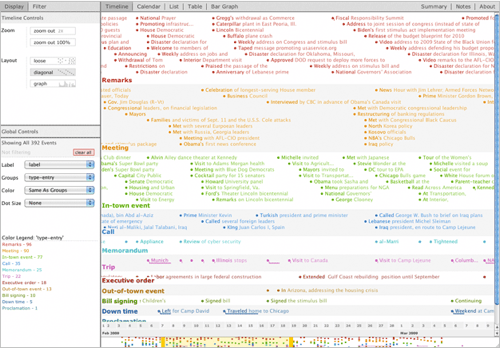
Normally when you win a Knight News Challenge grant, there’s not much of a question about what to do. You take the money! But for Fernanda Viegas and Martin Wattenberg of Flowing Media, winning in the 2010 competition prompted a tough decision. Ultimately, the data visualization team, responsible for such Internet classics as NameVoyager and Many Eyes, decided to turn down the grant. “We had to think very hard about this,” Viegas told me. “It wasn’t going to work for us.”
The reason: Viegas and Wattenberg didn’t like the open-source component of the News Challenge grant agreement, which requires that winners share all work done under the grant under a copyleft license that maximizes openness. “The licensing requirements weren’t right for us, or the project, really,” Viegas explained. (Their pitch was for a data visualization tool for news organizations; they declined to go into more detail than that.)
As the News Challenge FAQ states:
By “open-source” we mean a digital open-source platform that uses a code base that can be used by anyone after the grant period to either replicate your project in their community or to build upon it. You will own your platform, but you will have to share under GPL or Creative Commons licensing.
[…]
The applicant holds the intellectual property rights, subject to Knight Foundation’s requirement that the intellectual property be shared with the world…If you win, however, under the open-source rules you’ll have to share your software code and other know-how with everyone.
[…]
You would have to publish anything that you developed using grant funds. And it has to be something that is fully-featured and ready to be used by anybody who has a minimum tech capacity.
[…]
[in response to: Will you really fund a for-profit company?] Yes, if the company is uniquely positioned to test or develop a new technique or technology and is willing to share the results of that test with everyone.
This isn’t the first time that the open-source requirement and a grant winner’s desire for profits have been sticking points in a News Challenge grant. Last year, after KNC winner Everyblock was sold to MSNBC.com, Knight said it was rethinking how to restructure grant deals, and there was much discussion around what, exactly, an open-source release meant in the context of a for-profit company. (Check the heated comments on that post to get an idea of how vehement things got.) With almost half of this year’s winners being for-profit companies, it’s a question that was bound to come up again.
I emailed with Marc Fest, the vice president for communications at Knight, about Flowing Media’s decision. He explained that for-profit companies have a choice under the News Challenge rules. Winners can accept a grant and bind themselves to the GNU General Public License, which makes the code reusable or alterable by anyone else. Alternately, for-profits can choose to structure the winnings as a zero-percent interest loan that must be repaid. A version of the project would still need to be released under the GPL.
I asked Fest if Knight will use the same rules again next year, the fifth year of the competition. “The News Challenge is as much an experiment as the projects it supports,” he wrote. “We’ve learned from each year’s process and refined it. The current standards serve the purpose of broadly disseminating innovation through open source standards, GPL for software and Creative Commons for other material. We will continue to learn and innovate to better serve those objectives. If any changes happen, we will let the applicants know.”
Flowing Media’s decision, the company says, doesn’t mean they’re against open-source projects. The team is currently building an open-source tool to help journalists plot data on a timeline. At a Hacks/Hackers event in Cambridge, Viegas and Wattenberg presented their project, Time Flow, to techies and journalists. The journalists in the audience I spoke with appreciated the potential the software has to help reporters find untold stories in data. “In the journalism world, there still aren’t great analytical visualization tools. This is an experiment in that,” Wattenberg explained. Flowing Media is working on the project with Duke’s Sarah Cohen, a journalism professor and long-time investigative journalist. Cohen wanted a tool that broke away from the “impulse to aggregate,” letting journalists continue to dive deep into their reporting. An early version of the desktop application is available for download.
As for their proposed News Challenge project, it’s been tabled. Instead, the team will work on projects for Google, which recently hired away both Wattenberg and Viegas. They’ll continue to do data visualization work there.
Though Flowing Media’s situation was a bit unusual, it’s part of a broader issue floating in the News Challenge world: How do Knight grants setup a project that’s financially sustainable for the long-haul? Other winners have struggled to figure out a way to sustain their projects once Knight’s funding runs out. The foundation recently announced hiring a director of business consulting, Benoit Wirz, to consult with “select Knight grantees.” Perhaps that’s an acknowledgment that free money is still complicated.